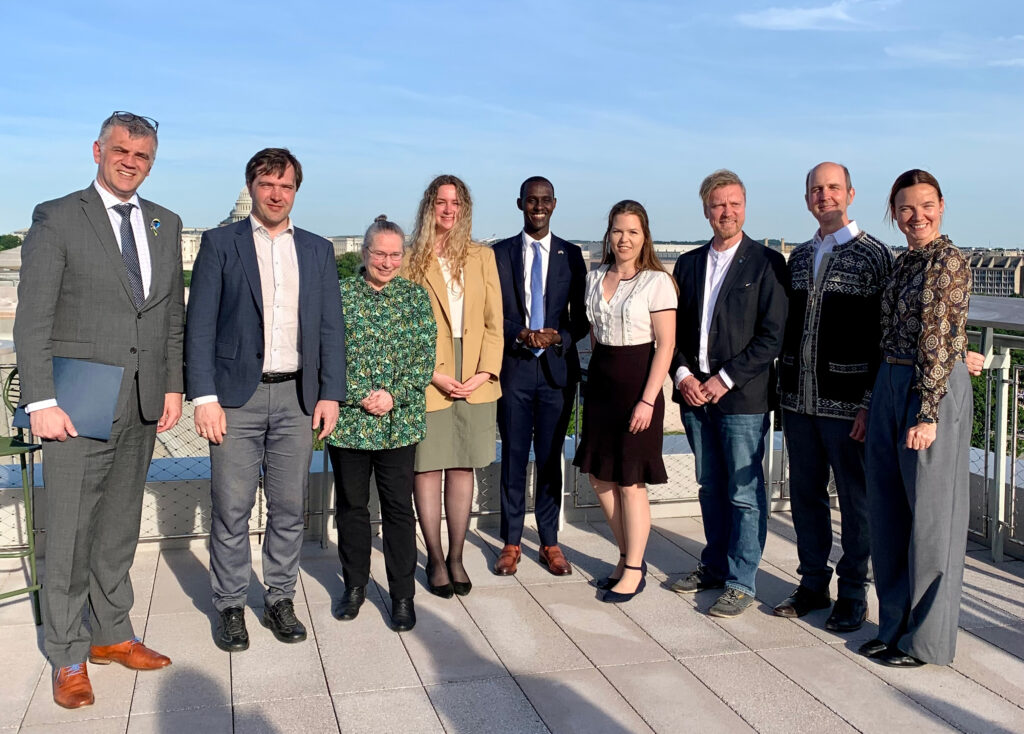Global climate crisis is too big for any one country to solve
Experts say collaboration between all nations—both big and small—is absolutely essential
Key Takeaways:
- Countries big and small must collaborate to address the global challenge of climate change, leading scientists and diplomats said at a recent event at the Hopkins Bloomberg Center.
- Small nations such as Estonia and Rwanda have started to share knowledge and tools to help solve the crisis.
- Funding for basic science remains critical in order to find solutions to combat climate change.
The effects of climate change vary dramatically in different parts of the globe, but solving the crisis will only happen when all nations work together, experts said at a recent climate science diplomacy event at the Hopkins Bloomberg Center, organized by the JHU Science Diplomacy Hub.
“There are issues that are local, that are regional, and that touch us all on this globe. One of these burning issues that has to be tackled globally is the issue of climate change,” said Kristjan Prikk, Estonian ambassador to the United States. “There is no collective effort as enormous and as demanding as solving the climate crisis. All countries can contribute—and it’s best done in collaboration.”
Additionally, researchers in widely different scientific fields must work together given the enormity and interconnected nature of climate change impacts, which threaten health in a range of areas, from extreme weather events to vector-borne diseases to food safety and security, experts added.
“One field of science cannot solve it. We need collaboration, and science holds a lot of knowledge on how to solve these climate problems,” said Heikki Junninen, head of laboratory of atmospheric and environmental sciences and professor of environmental physics at the Institute of Physics, University of Tartu, Estonia.

Still, Junninen said there remains much scientists don’t know about how the climate system works, highlighting the need for greater funding for basic science, which aims to increase basic knowledge, as opposed to applied science, which uses that knowledge to solve specific problems.
“There are plenty of cases where we can show that we don’t understand the climate system well enough to ask scientists to find a solution for a problem. Even some of the basics of the climate system are still unknown,” Junninen said. “Unfortunately, science funding is putting lots of pressures for solutions in applied science, but we cannot do applied science if we don’t have the basics.”
Yannick Tona, head of political affairs at the embassy of Rwanda in Washington, D.C., said it’s also critical for each nation to see the larger picture. That’s why Rwanda is focused on harnessing technology and science to support climate change resilience and environmental stability.
“We took a step back from responding to the climate crisis to looking at the big picture,” he said. “The strategy we have is looking at how we emphasize the well-being of our people. This has become key to what we do and how we design every project.”
For example, a majority of Rwandans use public transportation, mainly in the form of motorbike taxis. As a result, the country developed a national sustainable mobility policy to facilitate the transition to electric motorbikes as it continues to strive for low carbon economic growth.
“Investing in greener energy is not just a nice-sounding slogan. It’s cultural,” Tona said. “We’re looking at how do we help solve the challenges we have but also how do we make it environmentally friendly. It’s not just planting trees because everything is falling apart, but looking at the whole ecosystem.”